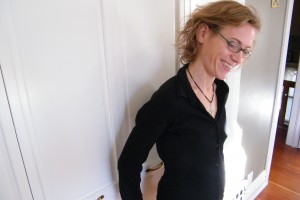The Cathedral Of Erotic Misery
Blood accumulates as I lean over the kitchen counter
A bead of light a bleach of starlight
Like a virgin asleep—
an olive on the bottom of the martini glass
Not long ago I was on the floor in the posture of
animal-trap
My blank face my “countenance” was “information”
I thought I’d take a walk through time
Was your dog there? Yes, he’s always there
The heat so un-sorry, the heat, I mean, so un-sexy
I repurposed it as love
Water sat in its puddle, somber as an infant
Bleary shade or turquoise thing
and a child, its wet parts. Hell in my heel
I entered the blue church for the blue event: Korsakov’s flute-song
My pew, my chocolate pew (tasted like blood)
Back home, children whispered at their screens. An early sunset glowing green
at the branchy wispy horizon
What about the crossing?
Did I not mention the crossing?
A boy’s hand quivered at his strings
A greeny sentinel. Evan kissed my cheek then. He’s like a bus ride
to a new state
I was only trying to raise a son, raise a daughter, raise a daughter,
a garden. Opened my mouth
Endeavors not rewarded
Then I wanted to be laughing in the restaurant, but rather it was grim, with four children at different stages of whining (hunger, discomfort, boredom, disdain), and the other mother and I not meeting eyes, ashamed of having so little to say above the blare of music and the nearly inaudible but entirely visible whining. Having little to say because between us, a hinge, a division which had everything to do with class in America, but which was not particularly clear. That hinge, or that series of hinges, could be called “money” or it could be called “real life.”
%
Allow me to address the general populace with growing hostility, to gaze into the face of the opposition with
the soulless eyes of the filmed.
I carry no cash, so have no cash to give.
Life rearranged
Afflicted teen in the bathroom for one and one half hours.
Early sun. Sharpens the outlines of the trees.
A year of charting the wrong word spoken: Purple when I meant turtle.
I hear the birds cawing. Because of the sun. This ancient sound.
Up they rise into the very top branches. Some sit on the outermost tips.
What allows them / to choose?
%
In the dream I tell a room full of writers that I care about the human element in the poem. I say, not
all of you will agree with me, but this is what I believe: There must be a person in the poem.
And because I assume my own death
Tim, I’m sorry
biography

JULIE CARR is the author of six books of poetry, most recently 100 Notes on Violence (Ahsahta, 2010), RAG (Omnidawn, 2014), and Think Tank (Solid Objects, 2015). She is also the author of Surface Tension: Ruptural Time and the Poetics of Desire in Late Victorian Poetry (Dalkey Archive, 2013), and the co-editor of Active Romanticism: The Radical Impulse in Nineteenth-Century and Contemporary Poetic Practice, available ,through University of Alabama Press (2015). Her co-translations of Apollinaire and contemporary French poet, Leslie Kaplan have been published in Denver Quarterly, Kenyon Review, and elsewhere and a chapbook of selections from Kaplan’s Excess – The Factory has recently been released by Commune Editions. Carr was a 2011-12 NEA fellow and is an associate professor at the University of Colorado in Boulder where she teaches in the Creative Writing MFA program and the Intermedia Arts Writing and Performance Ph.D. program. She regularly collaborated with dance artist K.J. Holmes. She lives in Denver and helps to run Counterpath Press and Counterpath Gallery. A free chapbook of mostly prose, The Silence that Fills the Future, is available from Essay Press.